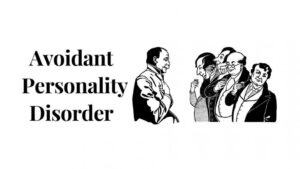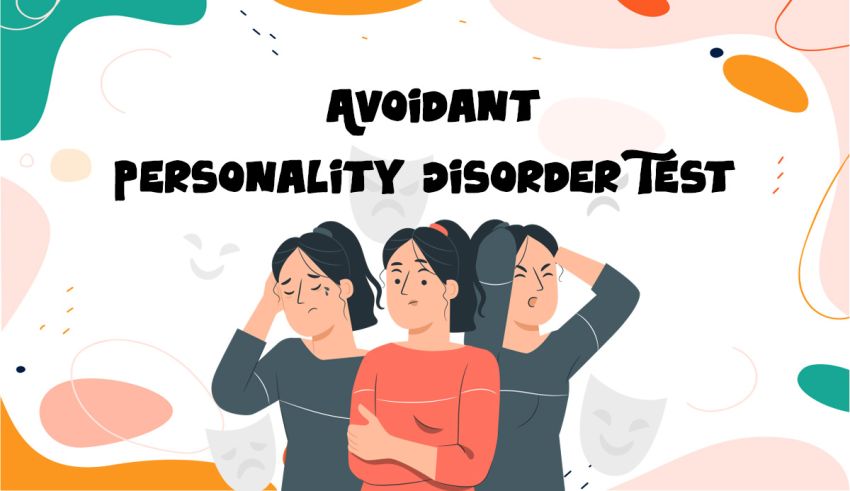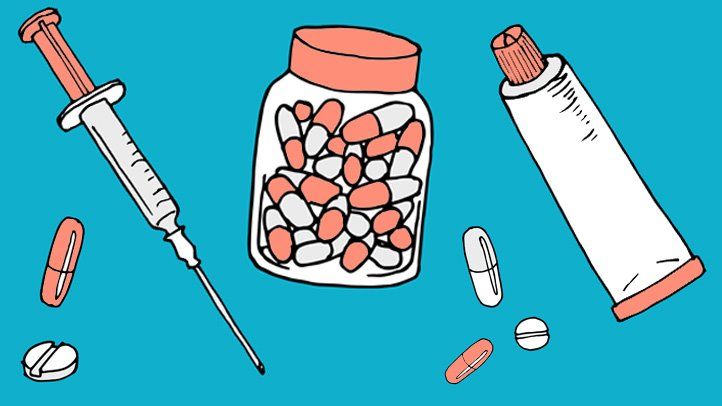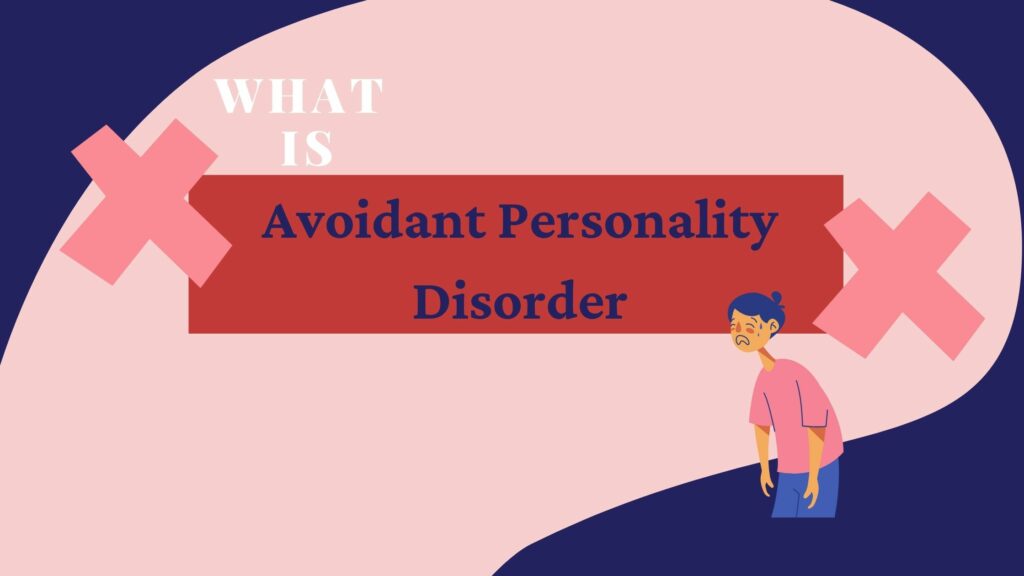If you are someone who struggles with anxiety, you may be familiar with the term “avoidant personality disorder.” This is a mental health condition that is characterized by a fear of social interaction and a lack of self-confidence. People who suffer from this disorder often find it difficult to make friends or date and may struggle in their professional lives. In this blog post, we will discuss the symptoms of avoidant personality disorder and provide tips for managing the condition.
Contents
- 1 What Is Avoidant Personality Disorder?
- 2 Symptoms of Avoidant Personality Disorder
- 3 Causes of Avoidant Personality Disorder
- 4 Risk Factors of Avoidant Personality Disorder
- 5 Diagnosis of Avoidant Personality Disorder
- 6 Treatment For Avoidant Personality Disorder
- 7 Self Help Strategies For Avoidant Personality Disorder
- 8 How To Help Someone With Avoidant Personality Disorder?
- 9 Conclusion
- 10 A Word From Therapy Mantra
What Is Avoidant Personality Disorder?
 An avoidant personality disorder is a mental condition in which people experience long-standing feelings of inadequacy and are extremely sensitive to criticism. They generally avoid social interaction for fear of being rejected or embarrassed.
An avoidant personality disorder is a mental condition in which people experience long-standing feelings of inadequacy and are extremely sensitive to criticism. They generally avoid social interaction for fear of being rejected or embarrassed.
An avoidant personality disorder is one of the most common personality disorders. It affects about 0.75% of the population.
This is more common in women than men. It also often co-occurs with other mental conditions, such as depression and anxiety disorders. Sometimes people assume it to be shy. There can be a lot of overlap between the symptoms of shyness and avoidant personality disorder. Sometimes, people with avoidant personality disorder are able to function well in their jobs and relationships. However, they may still feel a great deal of inner turmoil and anxiety.
This disorder usually begins in childhood or adolescence. It is thought to be caused by a combination of genetic and environmental factors.
If you think you may have an avoidant personality disorder, it is important to see a mental health professional for diagnosis and treatment.
Symptoms of Avoidant Personality Disorder

People with an avoidant personality disorder generally experience four main types of symptoms:
Social Inhibition
They are very reluctant to participate in social activities and tend to withdraw from social situations. They often have low self-esteem and feel that they are not good enough for social interaction. It also means that they do not have a lot of close friends. There can be a fear of being judged or ridiculed by others.
Shyness
People with avoidant personality disorder are often very shy and introverted. They find it difficult to initiate conversations with other people, and they usually don’t like to talk about themselves. This can make socializing quite uncomfortable for them. Sometimes they will avoid social situations altogether because they feel so shy. It also means that they are not very good at expressing their feelings or emotions.
Insecurity
People with this personality disorder often feel insecure and uncertain around others. They constantly worry about how they are being perceived by others, and they doubt their own abilities. This can make them feel quite anxious in social situations. It can also lead to them feeling lonely and isolated.
Lack of Confidence
People with this disorder often have low self-confidence. They don’t believe that they are capable of doing things well, and they often feel like they are not good enough. This can prevent them from trying new things or taking risks. It can also make them feel very anxious in social situations. Sometimes there are thoughts of self-harm or suicide.
Depression
People with this disorder often feel depressed and hopeless about their situation. This can lead to them feeling unmotivated and inactive. They may have thoughts of suicide or self-harm.
Anxiety
Many people with an avoidant personality disorder will experience high levels of anxiety in social situations. This can make it difficult for them to function normally in day-to-day life. They may also experience generalized anxiety, panic attacks, or obsessive-compulsive disorder (OCD).
Eating Disorders
Some people with an avoidant personality disorder will develop eating disorders such as bulimia nervosa or anorexia nervosa. This is often because they are trying to cope with their low self-esteem and lack of confidence.
Substance Abuse
People with an avoidant personality disorder may turn to alcohol or drugs as a way of coping with their social anxiety and isolation. This can lead to addiction and other serious problems.
Low Self-Esteem
Self-esteem is usually quite low in people with an avoidant personality disorder. This is due to the many symptoms that they experience, such as social inhibition, shyness, insecurity, and lack of confidence. Even if they are successful in some areas of their life, they will still feel like they are not good enough.
Causes of Avoidant Personality Disorder

There are many causes of avoidant personality disorder, and it is often difficult to pinpoint the exact cause. However, there are some risk factors that may increase the likelihood of developing the disorder. These include:
Violence
Violence is one sign that a child is at risk for developing an avoidant personality disorder. If a child experiences violence or abuse in their home, they may be more likely to develop the disorder as an adult. It is also important to note that violence is not limited to physical abuse. Emotional neglect or verbal abuse can also be damaging to a child.
Trauma
Traumatic experiences such as being in a natural disaster or being in a car accident can also increase the risk of developing an avoidant personality disorder. If a person has experienced trauma, they may be more likely to withdraw from social situations and feel insecure around other people.
Social Isolation
People who are socially isolated are at an increased risk of developing this personality disorder. This may be due to a lack of social support, or because the individual prefers to isolate themselves from others. Either way, isolation can be damaging and increase the risk of developing this disorder.
Isolation
People who grow up isolated from others are also more likely to develop an avoidant personality disorder. This may be due to a lack of social interaction during childhood, which can lead to problems forming relationships later in life.
Neglect
If a child is neglected by their parents, they may be more likely to develop an avoidant personality disorder. This may be due to the fact that these children don’t receive the emotional support they need from their parents, leading them to withdraw from social situations later in life.
Abuse
Abuse is one of the main causes of avoidant personality disorder. This can be physical, emotional, or sexual abuse. If a child is abused, they may be more likely to develop the disorder as an adult. There can be many long-term effects of abuse, including problems with self-esteem and relationships.
Risk Factors of Avoidant Personality Disorder

There are many risk factors that can develop an avoidant personality disorder. Some of these include:
Parents Separation
Sometimes people who experience a traumatic event, such as the death of a parent or being abandoned by a caregiver, may develop an avoidant personality disorder. There are many other risk factors that can affect this disorder. These are some of the most common.
Bullying
People who are bullied during childhood or adolescence may be more likely to develop this condition. Bullying can be a very traumatic experience, and it can be especially damaging for children who are already sensitive or shy. It can also lead to social isolation, which can further increase the risk.
Other Mental Health Conditions
People with other mental health conditions, such as anxiety or depression, may be more likely to develop an avoidant personality disorder. This is because these conditions can make it difficult for people to cope with everyday stressors and interact with others.
Negative Experiences in Previous Relationships
People who have had negative experiences in previous relationships, such as being cheated on or neglected by a partner, maybe at risk for developing this condition. These types of experiences can leave someone feeling scared and mistrustful of others.
Genetics
Genetics always plays a role in the development of any mental health condition, and it is thought that this disorder may be partially hereditary. If someone has a family member who has been diagnosed with avoidant personality disorder, they may be more likely to develop it themselves.
Age
Age is also one of the major risk factors associated with this condition. An avoidant personality disorder is most common in young adults, and it is thought that this may be due to the stressors that come with transitioning into adulthood. When someone gets old, they may be less likely to develop this disorder.
Diagnosis of Avoidant Personality Disorder

The diagnosis of this personality disorder is through different means. The diagnosis depends on symptoms that are present for at least six months. Some other means are:
Clinical Interview
Clinical Interviews help to assess whether an individual has symptoms of avoidant personality disorder. The interview will ask about symptoms and how they have impacted the individual’s life. Sometimes, the individual’s family or friends may be interviewed to gain additional information.
Questionnaires
Questionnaires are often used in addition to clinical interviews to assess symptoms of this personality disorder. These tests are not diagnostic, but they can provide information that can help with diagnosis. Some of these tests are:
- The Minnesota Multiphasic Personality Inventory (MMPI-A)
- The Millon Clinical Multiaxial Inventory III (MCMI-III)
- The Diagnostic Interview for DSM-IV Personality Disorders (DIPD-II)
Treatment For Avoidant Personality Disorder

There is no one-size-fits-all treatment for people with an avoidant personality disorder. However, there are some treatments that have been shown to be effective in treating the symptoms of the disorder. These include:
Cognitive Behavioral Therapy (CBT)
Cognitive-behavioral therapy is often the recommended treatment for people with an avoidant personality disorder. CBT helps to change the negative thoughts and beliefs that contribute to social anxiety and isolation. It also teaches coping skills that can help reduce anxiety in social situations. These are just a few of the things that CBT can do to help people with this disorder.
Dialectical Behavior Therapy (DBT)
Dialectical behavior therapy is another type of treatment that is effective in treating an avoidant personality disorder. DBT focuses on helping people to develop healthy coping skills and to improve their ability to regulate their emotions. It also teaches mindfulness, which can help people to be more present in the moment and less focused on their anxiety.
Medication
While there is no cure for an avoidant personality disorder, medication can also treat some of the symptoms. Medication can be especially helpful in treating other mental health conditions that often co-occur with an avoidant personality disorder, such as anxiety or depression.
Support Groups
Support groups are another option that can be helpful for people with an avoidant personality disorder. In a support group, people can share their experiences and learn from others who are dealing with similar issues. This can be a great way to get information and support from people who understand what you’re going through. These can also be found online.
Self Help Strategies For Avoidant Personality Disorder

There are many self-help strategies that can be helpful for those who suffer from an avoidant personality disorder. Some of these include:
Practicing Self-Compassion
Self-compassion is key for those with an avoidant personality disorder. Oftentimes, individuals with this disorder are hard on themselves and have a negative view of themselves. It is important to practice being kind and gentle to yourself, even when you make mistakes.
Challenging Negative Thoughts
Individuals with an avoidant personality disorder often have negative thoughts about themselves. These thoughts can be very harmful and lead to feelings of worthlessness and depression. It is important to challenge these thoughts and replace them with more positive ones.
Building Self-Esteem
Low self-esteem is common among those who suffer from an avoidant personality disorder. A lack of self-esteem can lead to feelings of insecurity and shyness. It is important to build your self-esteem by accepting yourself for who you are and recognizing your strengths and weaknesses.
Staying Connected
 It can be difficult for those with an avoidant personality disorder to connect with others. This is due to their fear of being rejected or embarrassed. It is important to find ways to stay connected, such as joining a support group or attending social events.
It can be difficult for those with an avoidant personality disorder to connect with others. This is due to their fear of being rejected or embarrassed. It is important to find ways to stay connected, such as joining a support group or attending social events.
Taking Care of Yourself
Individuals with this personality disorder often neglect their own needs in favor of taking care of others. It is important to make time for yourself and do things that make you happy. Furthermore, this could include spending time with friends, going on walks, or reading a book.
Making Sure to Get Help
If you feel like you are struggling to cope with this disorder, it is important to seek professional help. There are many resources available, such as therapists, support groups, and hotlines. Do not be afraid to reach out for help if you need it. There are people who can help you manage your disorder and improve your quality of life.
Doing Yoga
 Yoga is a great way to manage stress and anxiety. It can be especially helpful for those with an avoidant personality disorder, as it helps to focus the mind and connect with the body. It also helps to improve flexibility and strength, which can be beneficial for those who suffer from this disorder.
Yoga is a great way to manage stress and anxiety. It can be especially helpful for those with an avoidant personality disorder, as it helps to focus the mind and connect with the body. It also helps to improve flexibility and strength, which can be beneficial for those who suffer from this disorder.
Eating Healthy Diet
Eating a healthy diet is important for everyone, but it can be especially helpful for those with an avoidant personality disorder. This is because a healthy diet can help to improve mood and energy levels. Eating plenty of fruits, vegetables, and whole grains can help to improve your overall health and well-being.
Avoiding Alcohol and Drugs
It is important for those with this disorder to avoid alcohol and drugs. This is because these substances can worsen symptoms and lead to further problems. If you feel like you are struggling with substance abuse, it is important to seek professional help. There are many resources available to help you get sober and stay sober.
How To Help Someone With Avoidant Personality Disorder?

There are some things you can do to help someone with this disorder, but it’s important to understand that this is a disorder that primarily affects the sufferer and not those around them. Here are some things you can do:
Be Patient And Understanding
When you are around someone with Avoidant Personality Disorder, it is important to be patient and understanding. Remember that they are uncomfortable in social situations for a reason, and pressuring them will only make them feel worse.
Offer Support
Make sure the person knows that you are there for them when they need you. let them know that you care about them and want to help however you can. There are going to be times when the person with this disorder is going to need some time alone, and you should respect that.
Encourage Them To Seek Help
If the person seems interested in getting help for their disorder, encourage them to seek out professional assistance. There are many treatments available that can help people with this disorder. It’s important to start as soon as possible.
Avoid Criticism
This one should be pretty self-explanatory! avoid criticizing the person with this disorder, as it will only make them feel worse about themselves. Make sure you offer constructive criticism, but always do so in a way that is respectful and considerate.
Talk To Them
There are times when the best thing you can do for someone with this disorder is to simply talk to them. Let them know that you are there for them and that you understand what they are going through. Sometimes just having someone to talk to can make all the difference in the world.
Give Them Space
As we mentioned before, there are going to be times when the person with Avoidant Personality Disorder needs some time alone. It’s important to respect their wishes and give them the space they need. It also might be helpful to suggest some activities that they can do alone that they enjoy, such as reading or listening to music.
Educate Yourself
If you want to help someone with Avoidant Personality Disorder, it’s important to educate yourself about the disorder. The more you know about it, the better equipped you will be to help the person in your life who is struggling with it. Furthermore, there are many great books and articles out there that can teach you everything you need to know.
Conclusion
An avoidant personality disorder is a condition that can make it difficult for people to have close relationships. If you or someone you know has this disorder, it’s important to get help. However, there are treatments available that can help people manage their symptoms and improve their quality of life.
If you or someone you know has been diagnosed with this disorder, it’s important to seek treatment. Furthermore, there are many effective treatments available that can help reduce symptoms and improve quality of life.
A Word From Therapy Mantra
Your mental health — Your psychological, emotional, and social well-being — has an impact on every aspect of your life. Positive mental health essentially allows you to effectively deal with life’s everyday challenges.
At TherapyMantra, we have a team of therapists who provide affordable online therapy to assist you with issues such as depression, anxiety, stress, workplace Issues, addiction, relationship, OCD, LGBTQ, and PTSD. You can book a free therapy or download our free Android or iOS app.


